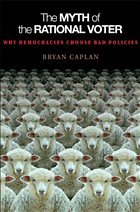The greatest obstacle to sound economic policy is not entrenched special interests or rampant lobbying, but the popular misconceptions, irrational beliefs, and personal biases held by ordinary voters. This is economist Bryan Caplan's sobering assessment in this provocative and eye-opening book. Caplan argues that voters continually elect politicians who either share their biases or else pretend to, resulting in bad policies winning again and again by popular demand.
Boldly calling into question our most basic assumptions about American politics, Caplan contends that democracy fails precisely because it does what voters want. Through an analysis of Americans' voting behavior and opinions on a range of economic issues, he makes the convincing case that noneconomists suffer from four prevailing biases: they underestimate the wisdom of the market mechanism, distrust foreigners, undervalue the benefits of conserving labor, and pessimistically believe the economy is going from bad to worse. Caplan lays out several ways to make democratic government work better--for example, urging economic educators to focus on correcting popular misconceptions and recommending that democracies do less and let markets take up the slack.
The Myth of the Rational Voter takes an unflinching look at how people who vote under the influence of false beliefs ultimately end up with government that delivers lousy results. With the upcoming presidential election season drawing nearer, this thought-provoking book is sure to spark a long-overdue reappraisal of our elective system.
Table of contents:
List of Figures ix
Preface and Acknowledgments xi
INTRODUCTION: Before Realism and Liberalism 1
PART I: Traditions and Theory CHAPTER ONE: Republican Security Theory 27
CHAPTER TWO: Relatives and Descendants 61
PART II: From the Polis to Federal Union CHAPTER THREE: The Iron Laws of Polis Republicanism 91
CHAPTER FOUR: Maritime Whiggery 114
CHAPTER FIVE: The Natural'Republic' of Europe 136
CHAPTER SIX: The Philadelphian System 161
PART III: Toward the Global Village CHAPTER SEVEN: Liberal Historical Materialism 193
CHAPTER EIGHT: Federalist Global Geopolitics 215
CHAPTER NINE: Anticipations of World Nuclear Government 244
CONCLUSION 265
NOTES 279
Index 375
Boldly calling into question our most basic assumptions about American politics, Caplan contends that democracy fails precisely because it does what voters want. Through an analysis of Americans' voting behavior and opinions on a range of economic issues, he makes the convincing case that noneconomists suffer from four prevailing biases: they underestimate the wisdom of the market mechanism, distrust foreigners, undervalue the benefits of conserving labor, and pessimistically believe the economy is going from bad to worse. Caplan lays out several ways to make democratic government work better--for example, urging economic educators to focus on correcting popular misconceptions and recommending that democracies do less and let markets take up the slack.
The Myth of the Rational Voter takes an unflinching look at how people who vote under the influence of false beliefs ultimately end up with government that delivers lousy results. With the upcoming presidential election season drawing nearer, this thought-provoking book is sure to spark a long-overdue reappraisal of our elective system.
Table of contents:
List of Figures ix
Preface and Acknowledgments xi
INTRODUCTION: Before Realism and Liberalism 1
PART I: Traditions and Theory CHAPTER ONE: Republican Security Theory 27
CHAPTER TWO: Relatives and Descendants 61
PART II: From the Polis to Federal Union CHAPTER THREE: The Iron Laws of Polis Republicanism 91
CHAPTER FOUR: Maritime Whiggery 114
CHAPTER FIVE: The Natural'Republic' of Europe 136
CHAPTER SIX: The Philadelphian System 161
PART III: Toward the Global Village CHAPTER SEVEN: Liberal Historical Materialism 193
CHAPTER EIGHT: Federalist Global Geopolitics 215
CHAPTER NINE: Anticipations of World Nuclear Government 244
CONCLUSION 265
NOTES 279
Index 375

